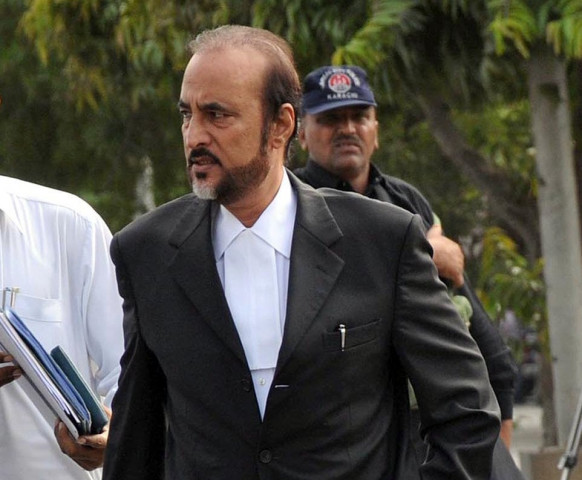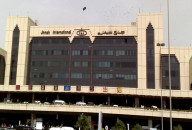PTI lawmakers adamant for Babar Awan to join parliament
Awan resigned as adviser to the prime minister on parliamentary affairs in September of last year

Babar Awan. PHOTO: INP
Awan resigned as adviser to the prime minister on parliamentary affairs in September last year after filing of reference against him on the charges of causing inordinate delay in the construction of the 525MW Nandipur power plant.
Currently, Awan, who is Prime Minister Imran Khan's attorney in several cases, has been on special terms with the premier.
It is learnt that the PM considered awarding the portfolio of information & broadcasting to Awan after replacing Chaudhry Fawad Hussain but he could not do so because his case was pending in the accountability court. Now, he is again one of the favourites for the post. Likewise, his name may be considered for any other important portfolio.
Awan has a reputation to manipulate legal fraternity opinion in favour of the government. As a law minister, he did the same during Pakistan Peoples Party (PPP's) regime by distributing millions of rupees in the bar associations.
His services may again be hired to gather lawyers' support in the prevailing situation wherein the bar is strongly opposing the government's presidential references against Justice Qazi Faez Isa and Justice KK Agha.
However, sources reveal that PTI ministers and government functionaries are adamant that Awan should occupy any portfolio; otherwise, they will be become redundant. Even few law officers, who had been appointed on the advice of Awan have been removed.
It has been witnessed that PPP senior ministers were unhappy with Awan due to his close association with former Asif Ali Zardari. Even the incumbent Attorney General of Pakistan Anwar Mansoor Khan had resigned after clash with him on the issue of writing letter to Swiss authorities for the reopening of corruption case against PPP co-chairman in view of Supreme Court's judgment in NRO case.
Close aide of Awan believes that he does not need any portfolio as his stature is already very high. He has special association with the premier and his private practice is very good.
An interim investigation report submitted by the National Accountability Bureau (NAB) in the Supreme Court had revealed that the country suffered a loss of Rs27 billion in the construction of Nandipur power project due to a delay caused by federal law ministry in 2009.
It was during the PPP-led government that a petition against the delay was filed by former foreign minister and Pakistan Muslim League-Nawaz (PML-N) leader Khawaja Asif in 2011.
The apex court on October 26, 2011 constituted a commission to probe into the delay and assigned the task to Justice (retd) Rahmat Hussain Jaffri.
The commission examined the relevant witnesses and submitted its report on April 9, 2012.
Later, the water and power ministry referred the case to NAB in the light of the judicial commission's report on the hydropower project.
The anti-graft watchdog later converted a formal inquiry into the alleged delay in the project into an investigation on January 22, 2018. Later, the apex court led by chief justice Mian Saqib Nisar initiated proceedings to file corruption reference on matter.
The Nandipur power project was approved by the Economic Coordination Committee on December 27, 2007 at a cost of $329 million. After approval, the contract was assigned on January 28, 2008 to the Northern Power Generation Company (DEC) China.
The finance ministry issued sovereign guarantee on October 31, 2009 but the law ministry replied that the legal opinion could not be issued on a document, which was never cleared by this division.
The issue was resolved through the federal cabinet on August 24, 2011. Later, legal opinion was issued by the law ministry on October 19, 2011 after a delay of two years.
The report says the ministry had refused to issue legal opinion on the grounds that it did not vet agreement and the rules of business 1973 do not allow granting "ex post facto" approval.
The water and power ministry repeatedly requested the law ministry to issue legal opinion but the efforts went in vain.
Hence, the agreement could not be executed due to conflict between the ministry of law and ministry of power and a delay of more than two years occurred in the execution of the finance agreement.
The total loss due to non-issuance of legal opinion by the law ministry in Nandipur power project amounts to Rs27. 3 billion, the report says.
Giving details of the breakup, it says Rs20 billion is the difference between PC-1 and the revised PC-1 purely due to escalation cost and variation in exchange rate and Rs4.36 billion was paid to the Chinese company for remobilisation and EOT cost and repair, replacement and repacking.
The report states that during the investigation it was found that officers and officials of the law ministry failed to exercise their authority lawfully and committed the offence of corruption and corrupt practices as defined under Section 9 (a) (vi) and (xii) of the NAO.
The accountability watchdog added that it possesses all relevant record from both the ministries and the statements of the accused and witnesses were being recorded. However, the accountability court acquitted Awan over charges of corruption.
Meanwhile, Awan called on Prime Minister Imran Khan here on Wednesday - his first time meeting following his acquittal on Tuesday by the accountability court in the Nandipur corruption reference.
Talking to media outside the Parliament House, Awan said that all the money launderers had united in All Parties Conference (APC) to seek National Reconciliation Ordinance (NRO) and that the opposition would never tender resignations from the National Assembly.



















COMMENTS
Comments are moderated and generally will be posted if they are on-topic and not abusive.
For more information, please see our Comments FAQ